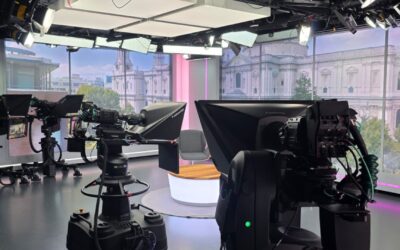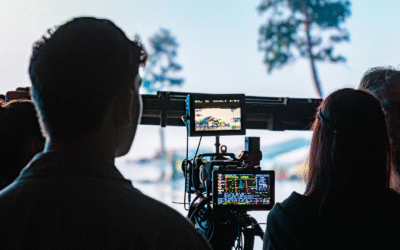Unlocking the Potential of LED Virtual Production in UK Film Education
Incorporating LED Virtual Production technology into UK film courses offers a multitude of benefits. In this piece, I explore how this innovative approach can reshape the way film students learn and prepare for a future in the industry.
1. Realistic Filmmaking Environments:
- Replicating Iconic Locations: In the film industry, LED Virtual Production is utilised to replicate iconic or challenging real-world locations. For instance, film productions can recreate historical settings, fantasy worlds, or exotic location with astonishing accuracy. In film education courses in the UK, students have the opportunity to develop hands-on skills by creating their versions of these virtual environments. This provides invaluable experience in setting design, lighting, and cinematography.
2. Industry-Standard Skill Development:
- Practical Training: LED Virtual Production allows film students to gain practical experience using professional-grade equipment and techniques. This hands-on approach aligns with the demands of the UK film industry, where employers seek graduates with a strong foundation in the latest industry practices. From camera operation to lighting design, students are better prepared for the realities of film production.
3. Creative Freedom and Flexibility:
- Visual Effects Mastery: In film, visual effects play a pivotal role in storytelling. LED Virtual Production empowers students to experiment with VFX, enabling them to create unique and captivating effects. This creative freedom encourages them to push the boundaries of storytelling, which is a hallmark of successful UK film industry projects.
4. Sustainable Film Practices:
- Reducing Environmental Impact: The UK film industry, like many others, is increasingly focused on sustainability. LED Virtual Production reduces the need for extensive location shoots, minimising the industry’s environmental footprint. Film students, by learning these eco-friendly practices, are better prepared to work in an industry that values responsible and sustainable filmmaking.
5. Cost-Effective Training:
- Efficient Resource Utilisation: LED Virtual Production reduces the need for costly on-site filming and extensive set construction. In film education courses, this cost efficiency ensures that students can access high-quality training without financial barriers, mirroring industry trends where cost-effective solutions are embraced.
6. Skill-Ready Graduates:
- Professional-Grade Projects: Film students have the opportunity to create internal course projects using LED Virtual Production. These projects can showcase their technical and creative skills to potential employers in the UK film industry. Graduates enter the workforce with a demonstrated ability to handle professional-grade equipment and tackle complex projects.
7. Interdisciplinary Learning:
- Film and Technology Integration: LED Virtual Production blends the worlds of film and technology, emphasising the importance of an interdisciplinary skill set. Film students in the UK are exposed to the latest technological advancements in the industry, enhancing their ability to adapt to an ever-evolving field where technology and filmmaking are inseparable.
8. Real-Time Feedback and Iteration:
- Accelerating Skill Refinement: In the UK film industry, efficient production timelines are crucial. LED Virtual Production allows students to receive real-time feedback on their work. They can quickly iterate on scenes, experiment with different lighting setups, and adjust visual effects, mirroring the fast-paced environment of professional film sets. This accelerated skill refinement prepares them for the dynamic nature of film production in the UK.
9. Immersive Storytelling:
- Enhancing Narrative Impact: LED Virtual Production opens new avenues for immersive storytelling. Film students can explore innovative narrative techniques, such as interactive storytelling, that captivate audiences in unique ways. This skill extends their creative horizons, making them well-equipped to craft compelling narratives that resonate with audiences.
10. Collaboration Across Disciplines:
- Fostering Cross-Functional Teams: LED Virtual Production encourages collaboration between film students and those from other disciplines like animation, visual effects, and sound engineering. This collaborative approach mirrors the interdisciplinary nature of the UK film industry, where professionals from various fields work together to create cinematic masterpieces.
11. Future-Proofing Skills:
- Adapting to Technological Shifts: The film industry is constantly evolving, with emerging technologies and techniques. LED Virtual Production instils in film students the importance of staying current with technological advancements. It teaches them to adapt to industry shifts, preparing them for long and successful careers in the ever-changing landscape of the UK film industry.
12. Real-World Project Experience:
- Preparing for Industry Challenges: LED Virtual Production introduces students to real-world project dynamics. They learn how to work under tight schedules, manage resources, and collaborate with diverse teams. This practical experience mirrors the challenges of the UK film industry, where professionals need to execute projects efficiently, manage budgets, and work closely with other departments.
In conclusion, LED Virtual Production is not just a technological advancement in the UK film education landscape; it’s a dynamic, all-encompassing tool that prepares students for the multifaceted world of filmmaking. By developing their skills, encouraging interdisciplinary collaboration, and fostering a mindset of adaptation to industry trends, it ensures that graduates are not just well-educated but also well-equipped to make meaningful contributions to the UK film industry.




